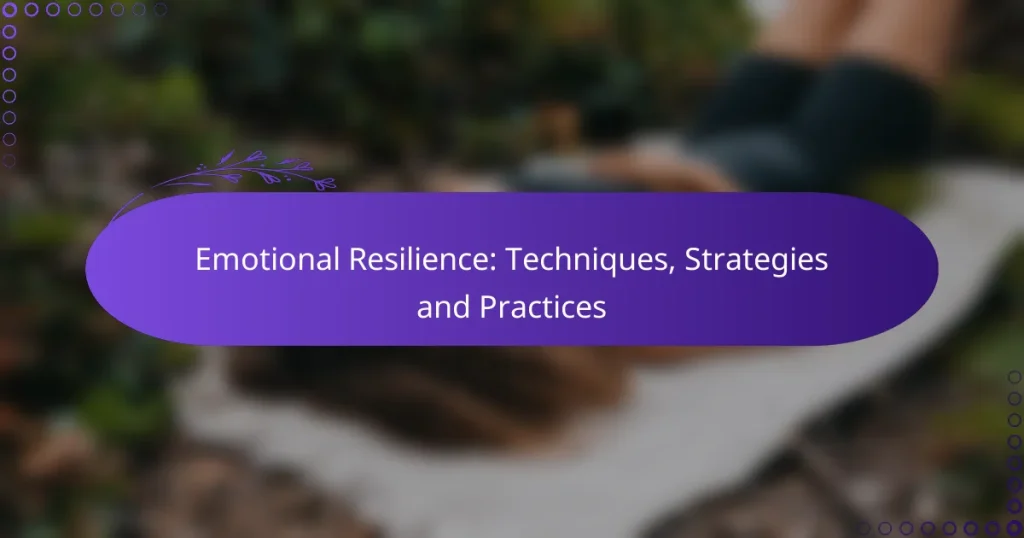Emotional resilience is the ability to adapt and thrive in the face of adversity, and it can be cultivated through specific techniques and practices. By enhancing coping skills, fostering strong relationships, and maintaining a positive mindset, individuals can better manage stress and navigate life’s challenges. Implementing effective strategies such as self-care and social connections further strengthens this vital trait, enabling a more robust response to setbacks.
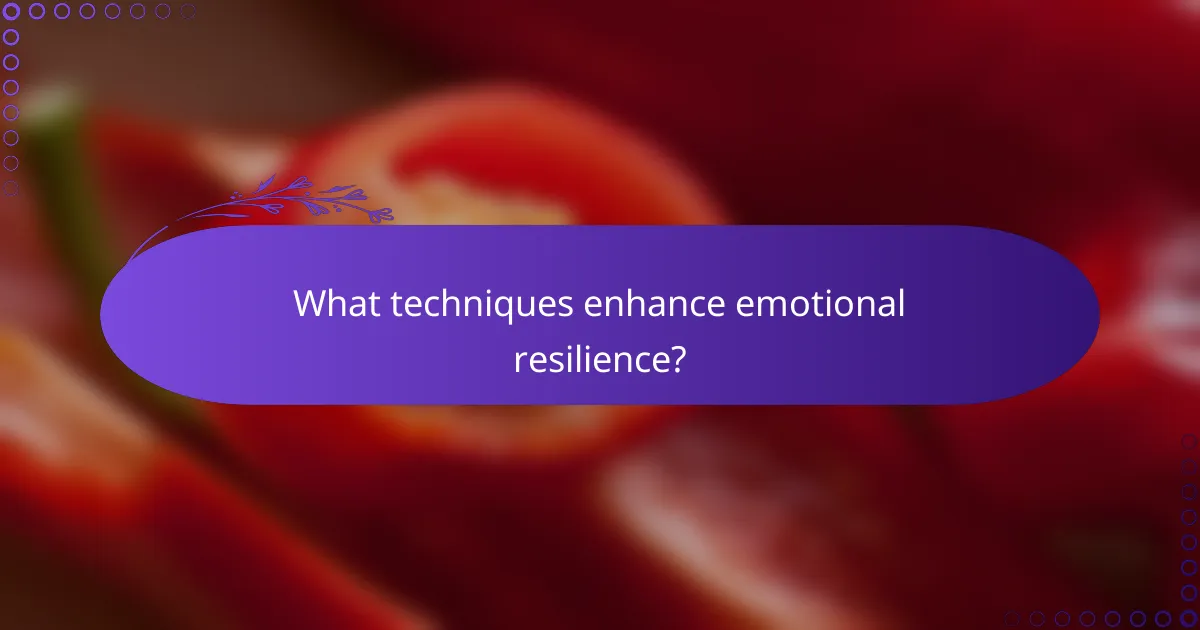
What techniques enhance emotional resilience?
Techniques that enhance emotional resilience focus on building mental strength and coping skills. These methods help individuals manage stress, adapt to challenges, and maintain a positive outlook during difficult times.
Cognitive Behavioral Techniques
Cognitive Behavioral Techniques (CBT) involve identifying and challenging negative thought patterns. By reframing these thoughts, individuals can reduce anxiety and improve their emotional responses to stressors.
Common CBT strategies include keeping a thought diary to track negative thoughts and practicing cognitive restructuring to replace them with more balanced perspectives. This approach can significantly enhance emotional resilience over time.
Mindfulness Practices
Mindfulness practices encourage individuals to stay present and fully engage with their thoughts and feelings without judgment. Techniques such as meditation, deep breathing, and body scans can help cultivate this awareness.
Regular mindfulness practice can lead to reduced stress levels and improved emotional regulation. Aim for at least 10-15 minutes of mindfulness exercises daily to experience its benefits.
Positive Affirmations
Positive affirmations are statements that reinforce self-worth and confidence. By repeating affirmations regularly, individuals can shift their mindset towards a more positive outlook.
Examples include phrases like “I am capable” or “I can handle challenges.” Incorporating these affirmations into daily routines can help strengthen emotional resilience over time.
Stress Management Techniques
Effective stress management techniques are essential for maintaining emotional resilience. Strategies such as time management, exercise, and relaxation techniques can help mitigate stress levels.
Consider creating a weekly schedule that includes time for physical activity and relaxation. Engaging in hobbies or social activities can also provide a necessary break from stressors.
Emotional Regulation Strategies
Emotional regulation strategies involve recognizing and managing one’s emotions in a healthy way. Techniques such as journaling, talking to a trusted friend, or practicing self-soothing can be beneficial.
Developing a personal toolkit of emotional regulation strategies can help individuals respond to challenges more effectively. Aim to identify and practice at least two or three strategies that resonate with you for better emotional resilience.
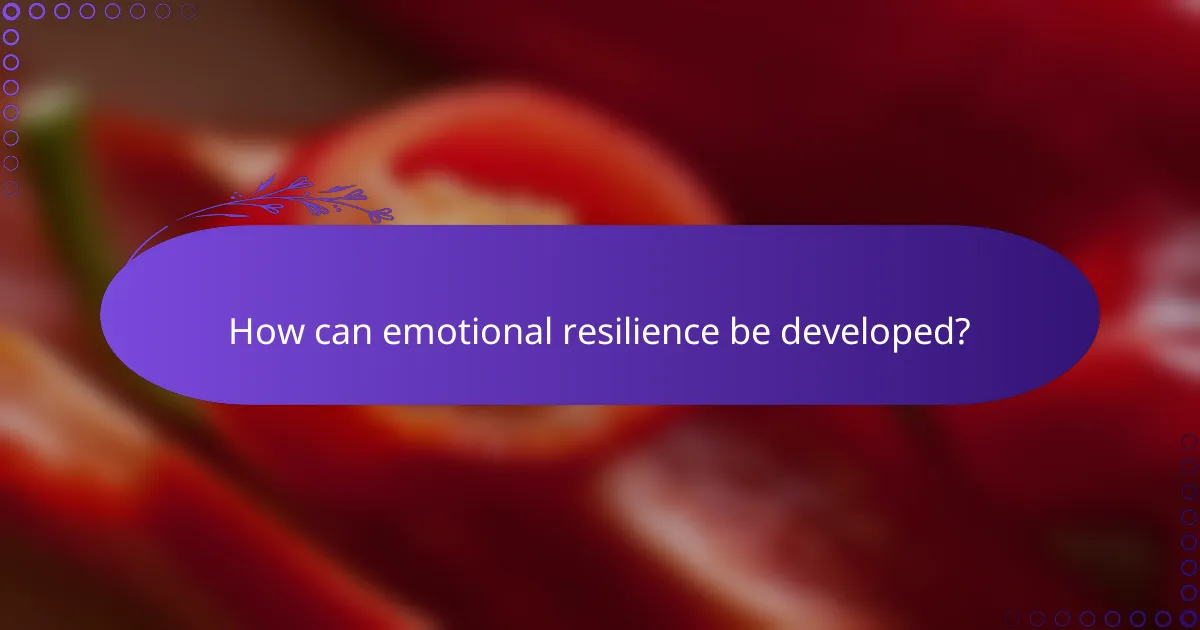
How can emotional resilience be developed?
Emotional resilience can be developed through intentional practices that enhance coping skills and foster a positive mindset. By focusing on building strong relationships, setting realistic goals, and practicing self-compassion, individuals can strengthen their ability to navigate life’s challenges.
Building Strong Relationships
Strong relationships provide essential support during difficult times, contributing significantly to emotional resilience. Engaging with friends, family, and community members fosters a sense of belonging and security.
To build these connections, prioritize regular communication and shared experiences. Simple actions like scheduling weekly catch-ups or participating in group activities can enhance bonds.
Be mindful of the quality of your relationships; seek out those who uplift and encourage you. Avoid toxic interactions that drain your emotional energy.
Setting Realistic Goals
Setting realistic goals helps create a sense of purpose and achievement, which is vital for emotional resilience. Break larger objectives into smaller, manageable tasks to avoid feeling overwhelmed.
Use the SMART criteria—Specific, Measurable, Achievable, Relevant, Time-bound—to guide your goal-setting process. For example, instead of saying “I want to be fit,” set a goal like “I will jog for 20 minutes three times a week.”
Regularly review and adjust your goals based on your progress and changing circumstances. This flexibility can prevent frustration and maintain motivation.
Practicing Self-Compassion
Self-compassion involves treating yourself with kindness during difficult times, which is crucial for building emotional resilience. Acknowledge your feelings without harsh self-judgment and recognize that everyone faces challenges.
Incorporate self-care routines that promote relaxation and well-being, such as mindfulness meditation or journaling. These practices can help you process emotions and foster a positive self-image.
Remember to celebrate your successes, no matter how small. Acknowledging progress reinforces resilience and encourages a growth mindset, making it easier to face future obstacles.
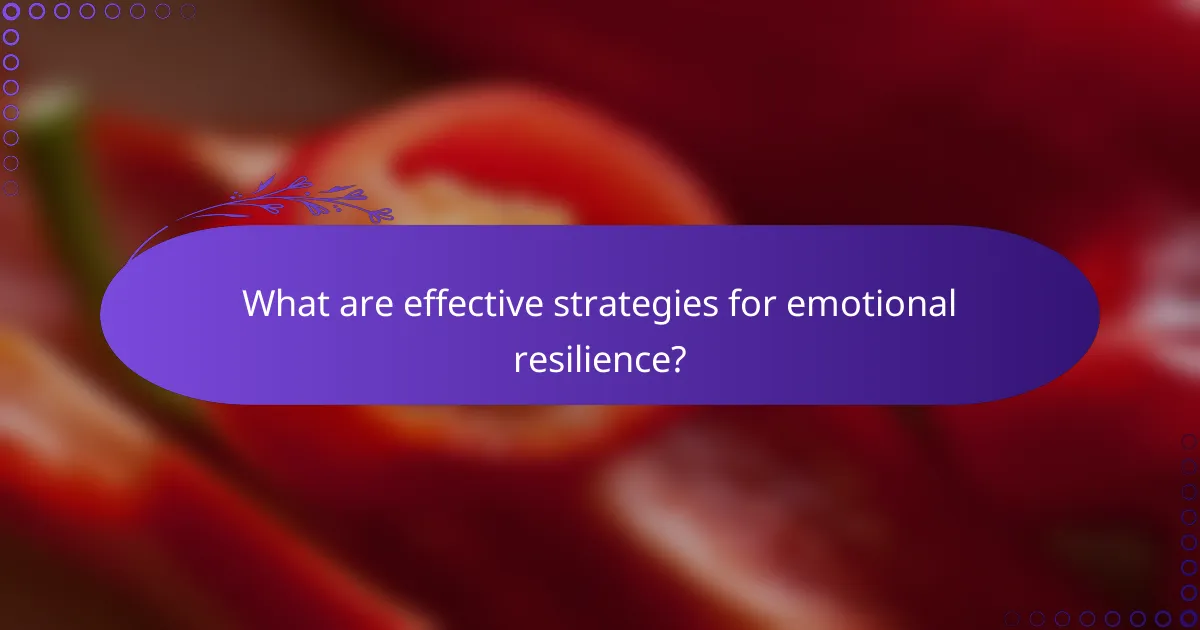
What are effective strategies for emotional resilience?
Effective strategies for emotional resilience include developing coping mechanisms, fostering social connections, and engaging in self-care practices. These approaches help individuals manage stress and recover from setbacks more effectively.
Journaling for Self-Reflection
Journaling is a powerful tool for self-reflection that allows individuals to process their emotions and experiences. By writing regularly, you can clarify your thoughts, identify patterns in your behavior, and track your emotional growth over time.
To get started, set aside a few minutes each day to write about your feelings, challenges, and successes. Aim for consistency rather than perfection; even a few sentences can provide valuable insights.
Physical Activity and Exercise
Engaging in physical activity is crucial for building emotional resilience. Exercise releases endorphins, which can improve mood and reduce stress. Regular physical activity can include anything from brisk walking to yoga or team sports.
Try to incorporate at least 150 minutes of moderate exercise into your weekly routine. Find activities you enjoy to make it easier to stay committed and reap the emotional benefits.
Seeking Professional Support
Seeking professional support is an important strategy for enhancing emotional resilience. Therapists and counselors can provide guidance, coping strategies, and a safe space to explore your feelings. This support can be particularly beneficial during challenging times.
If you’re considering therapy, research local mental health professionals and check if your health insurance covers their services. Many therapists offer sliding scale fees, making support more accessible.
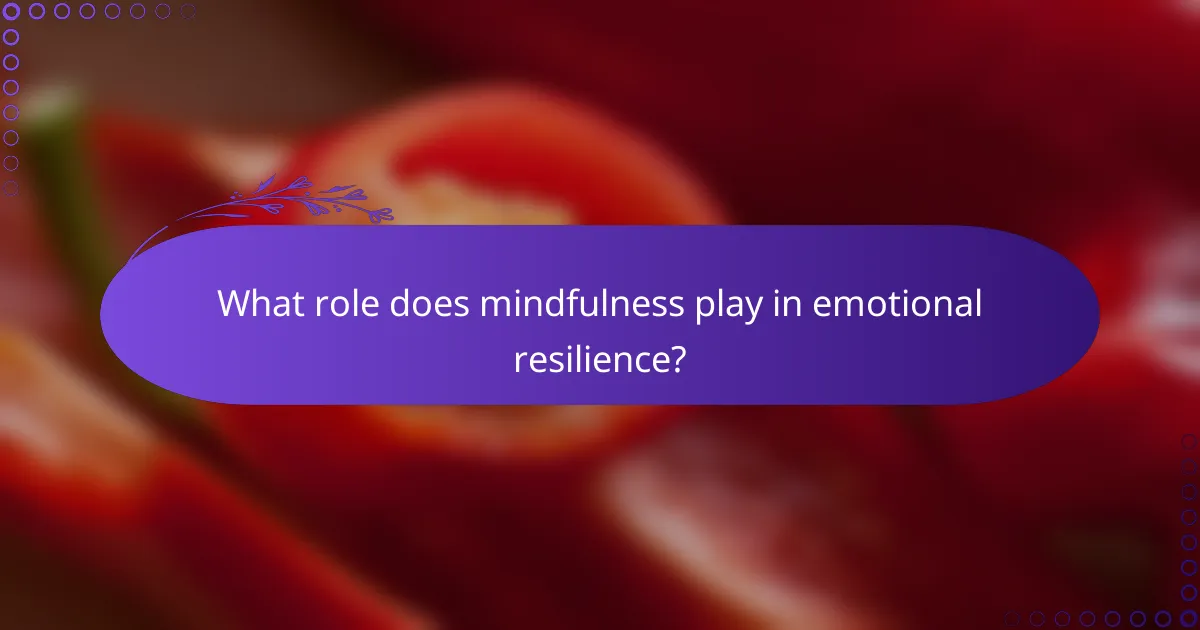
What role does mindfulness play in emotional resilience?
Mindfulness significantly enhances emotional resilience by fostering awareness and acceptance of thoughts and feelings. It allows individuals to observe their emotional responses without judgment, leading to better coping strategies during challenging situations.
Improving Focus and Clarity
Mindfulness practices, such as meditation and focused breathing, improve focus and clarity by training the mind to concentrate on the present moment. This heightened awareness helps reduce distractions and enhances cognitive performance, making it easier to tackle daily tasks and challenges.
To incorporate mindfulness for better focus, consider setting aside a few minutes each day for meditation. Techniques like the “5-4-3-2-1” grounding exercise can help sharpen your attention by engaging your senses and anchoring you in the present.
Reducing Anxiety and Stress
Mindfulness is effective in reducing anxiety and stress by promoting relaxation and emotional regulation. By practicing mindfulness, individuals learn to recognize and accept their feelings, which can diminish the intensity of anxious thoughts and stress responses.
To utilize mindfulness for stress reduction, try deep breathing exercises or progressive muscle relaxation. Aim for at least 10 minutes of mindfulness practice daily, gradually increasing the duration as you become more comfortable with the techniques.
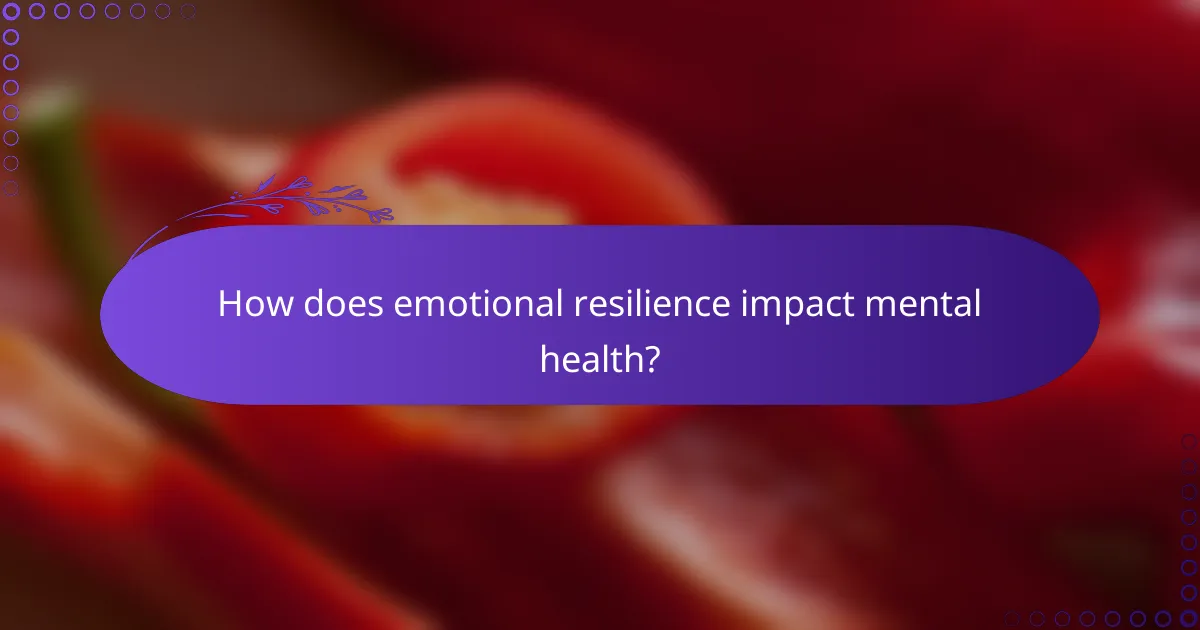
How does emotional resilience impact mental health?
Emotional resilience significantly enhances mental health by enabling individuals to navigate stress and adversity more effectively. This capacity helps reduce the risk of mental health disorders and promotes overall psychological well-being.
Lower Rates of Depression
Individuals with high emotional resilience often experience lower rates of depression. They are better equipped to manage negative emotions and recover from setbacks, which can prevent the onset of depressive symptoms. Research indicates that resilient individuals may have a reduced likelihood of experiencing major depressive episodes compared to those with lower resilience.
To foster resilience, consider engaging in regular physical activity, maintaining social connections, and practicing mindfulness. These strategies can help build a stronger emotional foundation, reducing vulnerability to depression.
Improved Coping Mechanisms
Emotional resilience leads to improved coping mechanisms, allowing individuals to handle stress more effectively. Resilient people tend to employ problem-solving techniques and adaptive strategies, which can mitigate the impact of challenging situations. This proactive approach helps them maintain a sense of control and reduces feelings of helplessness.
To enhance coping skills, practice techniques such as cognitive restructuring, which involves reframing negative thoughts, and developing a support network. These methods can empower individuals to face difficulties with confidence and adaptability.
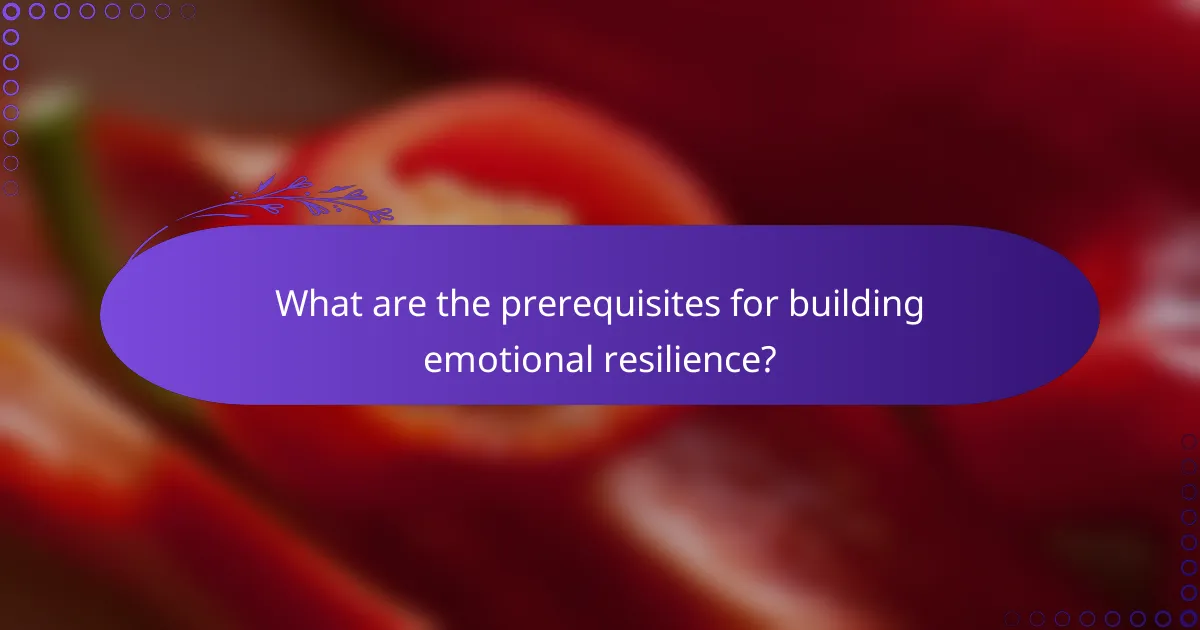
What are the prerequisites for building emotional resilience?
Building emotional resilience requires a foundation of self-awareness, emotional regulation, and a supportive environment. These elements help individuals recognize their emotions, manage stress effectively, and cultivate relationships that foster growth.
Self-Awareness
Self-awareness is the ability to recognize and understand your emotions, thoughts, and behaviors. It serves as the cornerstone for emotional resilience, enabling individuals to identify triggers and patterns that affect their emotional state.
To enhance self-awareness, consider practices such as journaling, mindfulness meditation, or seeking feedback from trusted friends or mentors. Regular reflection on your emotional responses can help you gain insights into how you react under stress.
Common pitfalls include ignoring your feelings or dismissing them as unimportant. Instead, aim to acknowledge your emotions without judgment, as this acceptance is crucial for developing resilience.
